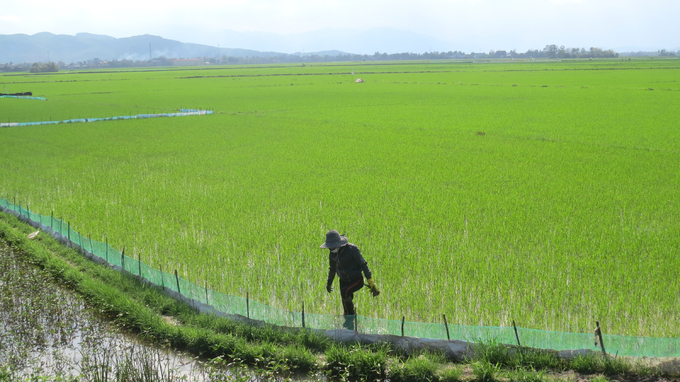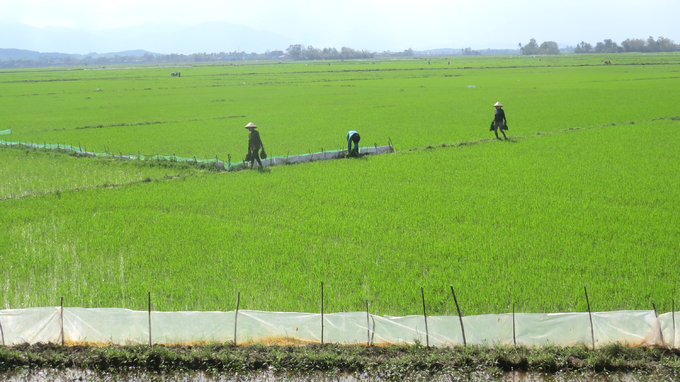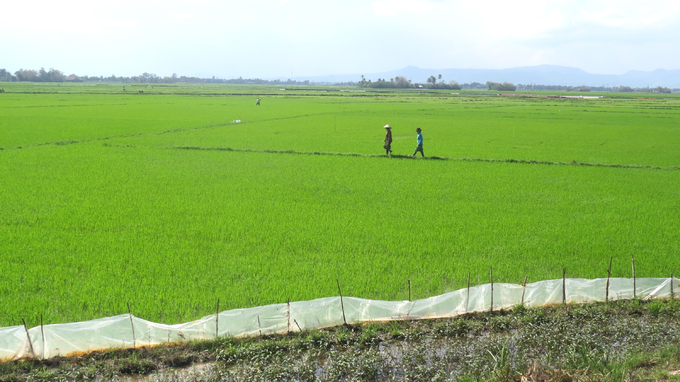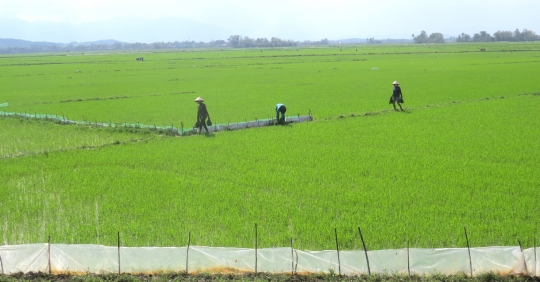The winter-spring crop of 2022 – 2023 does not have major floods, so rats breed and destroy rice on a large scale. In recent days, local farmers in Phu Yen Province have been going to the fields at the beginning of the year to prevent rats from biting and destroying rice, using wire netting and plastic bags to build fences around the rice fields to prevent them spread from one group to another. is different.
In a large field from Phu Dong and Phu Lam districts (Tuy Hoa town) through Hoa Thanh township to Hoa Vinh district (Dong Hoa town) around Hoa Binh 1 township (Tay Hoa district), farmers set up many rows of trees mice to fence.

Farmers build nets and nylon walls to keep mice out. Photo: Manh Hoai Nam.
Mr. Nguyen Van Kien, farmer in Hoa Thanh Township, said: This year the flood was low, only half of the field was flooded, the high field got the head of “Mr. Ty” not flooded, so the rats multiplied a lot. bite into the rice as the rice plants had just come out, young leaves. Throughout the region, rats burrow deep and are difficult to burrow and catch. There are no fields in this area that do not have rat tooth marks. The first solution to prevent rice from being bitten by rats is for farmers to build a nylon fence to prevent mice from crawling in and biting the rice.
Similarly, in the fields near the edge of the area in the field in Phu Dong District (next to National Road 1A), the rats did not miss any groups. Some were bitten by rats, rice was sparse with plenty of vacant land the size of a spade strewn about the field. From experience, farmers not only brought water to the field to “flood” it to prevent rats from wading in, but also fenced the bank with plastic to prevent the “rat family” from biting and destroying the rice.
Bui Van Nghia in Hoa Binh 1 commune (Tay Hoa district) said that before Tet, the newly seeded rice was eaten by yellow apple snails when young, farmers had transplanted kilometers and repaired their fields. During Tet, the rice is bitten again by the rat, the root is sparse if not prevented, at the end of the harvest the mouse bites and loses its yield.

Dense plastic walls are discreetly erected by farmers to deter rats. Photo: Manh Hoai Nam.
“Last afternoon I took my mother to a seniors’ meeting and in the morning I used the field to fencing with rats. Enjoy spring, but don’t forget to protect the crops. On the other hand, Tet on the first day of the Lunar New Year is long, during the day I go to work in the fields, in the evening I go to my relatives’ house to have a glass of spring wine to celebrate the New Year,” Nghia said.
Beside it, Mr. Phan Van Son went to visit the fields and said, “Farmers know when Tet will end. Free time is Tet, clearing the plastic table in front of the yard in the afternoon to invite 3-4 people for a glass of wine. Happy New Year, but also worry about the fields, use the field in the morning and afternoon to collect water, sprinkle manure and fence to prevent “Mr. Ty”‘s mouth from biting the rice.
According to statistics from Phu Yen Plant Protection and Cultivation Subdepartment, farmers in the province sowed 24,063 hectares in the winter-spring rice harvest of 2023, now yellow slugs and mice are causing damage in an area of 13 hectares. In addition, in Dong Xuan District, Phu Hoa District, Tay Hoa District, Dong Hoa City, Song Cau City and Tuy Hoa City, there are a number of other biological objects such as small leafrollers, stem borers and thrips scattered below the infection level.

Currently, the winter-spring rice in Phu Yen is in the tillering stage, very “tasty” for rats. Photo: Manh Hoai Nam.
Mr. Nguyen Van Minh, deputy head of Phu Yen’s Plant Protection and Cultivation Sub-department said: Since there was no major flooding in this crop, the number of rats left in the field was very high and they bit hard at the beginning of the steps.
From the start of the harvest, farmers actively prevent rats from biting the rice by erecting fences and wrapping plastic sheeting around the paddy fields to prevent them from biting and spreading from one group to another. In the coming period, the yellow apple snail, mice, leaf moths, fruit flies, etc. will continue to cause damage, so the planting and plant protection stations must coordinate with the Department of Agriculture and the Department of Economic Affairs cities to carry out the investigation and monitoring for timely detection and prevention to reinforce. Continue the rat extermination after the rabbit lunar new year to protect the crops.

